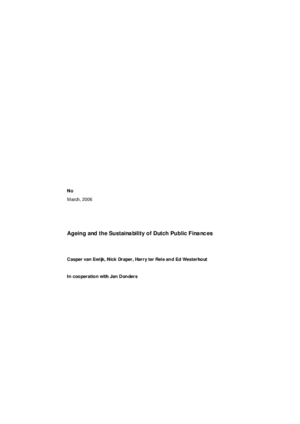Ageing and the sustainability of Dutch public finances
Fair distribution of ageing burden requires additional policy measures
The size of the problem is measured by the structural EMU-surplus, consistent with a constant net benefit.
For the Netherlands this appears to be equal to about +3% of gross domestic product (GDP) in 2011, the end of the forthcoming cabinet period. Given an EMU-surplus of about 0% in 2006, a substantial budgetary gap remains for the forthcoming cabinet: i.e., current policies are unsustainable. The sustainability gap is reduced to the extent that measures are taken to decrease the future ageing burden, such as an increase in the statutory pension age, or a reduction of the favourable tax treatment of the elderly. Postponement of policy measures now obviously also relieves the current problem, at the cost of an increasing burden for later generations.
This is the conclusion of a new study of CPB, Netherlands Bureau of Economic Policy Analysis, appearing today: 'Ageing and the Sustainability of Dutch Public Finances'. It updates and extends the earlier CPB study 'Ageing in the Netherlands' (2000). The new study is not only based on more recent data, but also employs a novel methodology to analyse the financial burden of ageing in that it uses a full-fledged dynamic general equilibrium overlapping generations model to account for behavioural reactions of economic agents. Apart from this model-based approach the study broadly follows the common framework underlying ongoing international assessments of the ageing problem by the EU and the OECD.
Increasing burden
Due to low fertility and increased life expectancy the elderly dependency ratio (number of 65+ per 20-64) will almost double, from 23.4% now to 43.4% in 2040. With unchanged policies public expenditure will increase by 7¼%-point from 48% now to 55% of GDP in 2040, mainly due to the increase in social security pensions (+4%) and public health care (+4%). Public revenue will increase as well. The main contributor to this increase is higher tax revenues from pensioners (+4%). Natural gas revenues will decrease by 1½% GDP due to the depletion of the Dutch natural gas resources, though. This is in turn counteracted by a number of other, smaller items, so that on balance revenues will increase by 4% of GDP. This is insufficient to compensate for the increase in public expenditures.
A target for the budget surplus
Current generations can help to address the future ageing burden by saving more now. This reduces public debt, so that lower future interest payments are due. This benefits future generations that have to face the higher ageing costs. If they are to be compensated fully, so that a constant net benefit for all generations obtains, current generations have to save up to 3% of GDP. This makes the budget sustainable under further unchanged policies. This sustainable surplus will be lower once policies are implemented to reduce future ageing costs. Increasing the statutory pension age in two steps from 65 now to 67 in 2025 reduces the sustainable budget surplus by ¾% of GDP. Immediately abolishing the favourable tax treatment of the elderly results in a further reduction by ¾%.
Postponement
If policies to make the budget sustainable are postponed, current generations benefit at the expense of future generations. When policies remain unchanged untill 2040, all generations up to 2040 benefit by 2.6% of GDP, as compared to the baseline scenario with immediate adjustment to a sustainable path. After 2040 the budget surplus will be 1.4% higher forever, though, indicating the loss of the generations living then. If, alternatively, we aim to return to the old sustainable path in 2074, the generations between 2040 and 2074 face an extra burden of 4.8% of GDP.
Why has sustainability worsened?
As compared to the 2000 study sustainability of Dutch public finances has worsened, despite considerable policy efforts directed towards increasing sustainability. The main factors behind this development are the following (a '+' indicates an increase in required additional measures, i.e., a worsening of the sustainability problem; the list is not exhaustive):
- Over the past few years the capital market interest rate has shown a considerable drop; accordingly expectations about the rate of return on pension fund savings have been adjusted downwards. In addition the stock market collapse has eroded existing pension assets. We now foresee considerably higher (tax exempted) pension premiums, resulting in slightly lower (taxed) pension payments. The joint effect of the lower interest rate and the more expensive pension provisions on the budget surplus target is + 3¼% GDP.
- The development of labour force participation of women is now estimated to be somewhat less favourable than 6 years ago (effect: +1¼% GDP).
- The reform of the disability scheme has caused a considerably more favourable development disability, both resulting in higher participation and lower disability claims (effect: -3% BBP).
- The recent reform of the health care system entails a technical correction related to the fact that a larger proportion of total health care is now in the public system (effect: +½% BBP).
- Higher oil prices have boosted the value of the stock of natural gas. All generations should benefit equally from this windfall gain. As current generations exhaust this resource, they accordingly have to pay a higher compensation to future generations (effect: +½% BBP).
Contacts

Read also the accompanying press release.
Indeed, the increase in expenditure on public pensions and health and long-term care will outweigh the increase in tax revenues. Budgetary reforms are therefore necessary in order to avoid that future generations will have to raise taxes or economize on public expenditure.
Reforms in the field of social security of the last few years are a step in the right direction, but are insufficient. In particular, the decline of interest rates and the reduced wealth of pension funds have worsened the sustainability of public finances. The effects of reforms on the intergenerational balance are important for the question which further reforms are most attractive.
